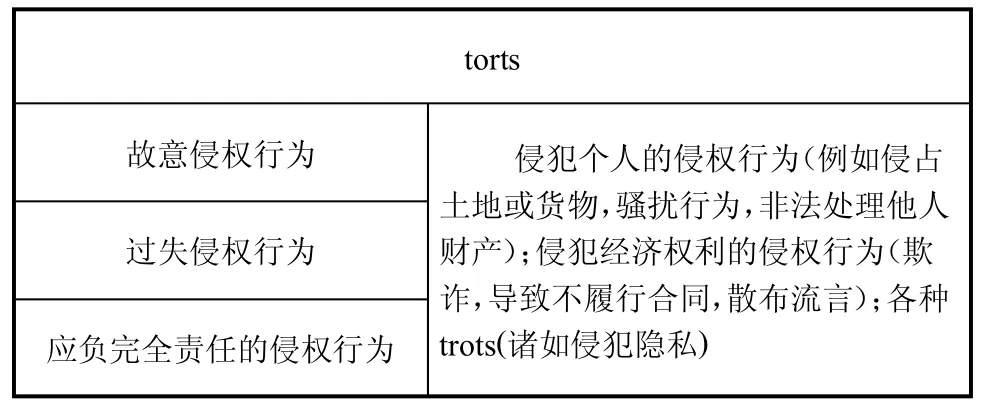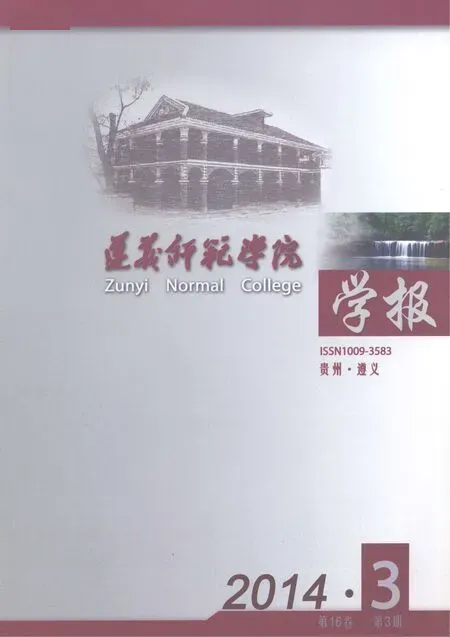评《英汉大词典》法学术语译名
谯晓南
(贵阳市清华中学,贵州贵阳550025)
评《英汉大词典》法学术语译名
谯晓南
(贵阳市清华中学,贵州贵阳550025)
双语词典收录两种语言的词汇是相互对应的。《英汉大词典》中存在相当多的法学术语译名不确,即非源语言的对应词语。作者以12个法学术语为例论述了《英汉大词典》译名方面存在的10个问题,与此同时,对这些术语的译名提出了修正意见。
《英汉大词典》;法学术语;译名;评论
双语词典收录的两种语言的词汇是相互对应的[1]。《英汉大词典》中存在相当多的法学术语译名不确,即非原语词的对应词语。
本文以12个法学术语为例论述《英汉大词典》译名方面存在的10个问题,与此同时,对这些术语的译名提出修正意见。
一、译名“达意”问题
“与其求守原文逐字意义,毋宁求达原文语意[2]。”《英汉大词典》中有的法学术语译名表现的是“逐字意义”,而非“原文语意”,例如:
(1)《英汉大词典》给infamous conduct的译名“无耻行为”就不是该术语的语意。该术语指的是“Any conduct in the course of the practice of a profession which competent practitioners of good repute would regard as disgraceful or dishonourable.It is a ground under various statutes for removing a practitioner’s name from the professional register[3].”(在从事某种职业的工作中的所为,合格的、名声好的从业者会将此种行为视为不光彩的或可耻的行为。这是造成以相关法规为据将行为人从该职业从业人员花名册中除名的一个理由)。这便是:丧失职业道德的行为。
这里有必要说明两点:其一,用作普通词语的disgraceful conduct(见《英汉大词典》第354页),dishonourable conduct(见《英汉大词典》第486页)均可译作“不光彩的行为”,“可耻的行为”;上述释义中使用的也是这两个词语;其二,infamous conduct作为法学术语而存在是一个不争的客观存在,自然应当有别于前两个普通词语,换言之,infamous conduct≠disgraceful conduct或 dishonourable conduct。
(2)《英汉大词典》将civil death译作“法律上的死亡(如被夺公权终身,失踪满一定期限法院宣告失踪人死亡等)”也含明显的“逐字”痕迹。该术语指:“A man was formerly said to be civilly death (civiliter) when he abjured the realm, went into a monastery,or had been attainted of treason or felony.The concept is now obsolete[3].”(当一个人放弃王国国籍,入寺成为修士、修女或因犯叛国罪、重罪而被剥夺财产和公民权利,该人便被宣告civil death)。作者将其译作:丧失或被剥夺公民权利。
二、译名“内包”问题
有的学者把“两种语言中词义范围大小不同的现象”称为“内包现象”[4]。我们在此借用“内包”之说,借指有的术语词义范围大小的不同,B术语的词义被A术语的词义所“内包”。《英汉大词典》的译名存在对“内包现象”的忽略,例如给tort的译名为“侵权行为”,给wrong的一个译名也为“侵权行为”,这是值得商榷的。
tort指的是:“Thetermincommonlawsystemsfor a civilly actionable harm or wrong,and for the breach of law dealing with liability for such wrongs.”(普通法体系中的tort指的是可提起民事诉讼的侵权行为,也指违法而应负责任的侵权行为)
“torts maybe classified intothose involving intention,those involving negligence,and the wrongs of strict liability.They may also be classified into torts affecting the person(e.g.trespass to land or goods,nuisance,conversion),economic right(deceit,inducement of breach of contract,injurious falsehood)and certain miscellaneous torts such as conspiracy.There are certain kinds of conduct,such as infringement of privacy, which are not yet,but may come to be,recognized as actionable torts[3].”译文见表1。

表1 torts译文
我们将其译作:(应负民事责任的)侵权行为。
而wrongs指:“Legal wrongs are themselves distinguished into two overlapping categories, civil wrongs and criminalwrongs.Civilwrongs are thoseinfringements of the right,of others or breaches of legal duty,normally causing personal or pecuniary loss,to others,which give rise to a civil remedy or claimfor redress by the wronged individual,for injunction,damages,accounting or other civil remedy.They include,in particular,breaches of contract,torts,breaches of trust, and some breaches of statutory duty.Criminal wrongs are those infractions of the criminal code of a particular statewhich,by thatcode,aredeemed for thesakeofthe generalwelfare to require repression and to justify punishment of the persons responsible.Criminal wrongs may again be contraventions of common law or of statute[4].”(用于法律中的wrongs分为内涵部分相同的两类:应负民事责任的侵权行为和应负刑事责任的侵权行为,应负民事责任的侵权行为特指不履行合同以及不履行某些法定义务。应负刑事责任的侵权行为是指:对违反国家刑法典的责任人课处刑罚,还指违反普通法或法规的违法行为)。作者将其译为:(应负民事责任的)侵权行为,(应负刑事责任的)侵权行为。
三、译名错误问题
《英汉大词典》中存在的译名错误并不难觅,例如将commission of the peace译作“1.治安官;2.治安官的职权”。
该术语仅指:“AcommissionissuedbytheCrown appointing a number of persons to act as justices of the peace within a stated area.Prior to 1835 commissions were issued only to counties,justices in boroughs hav-ing jurisdiction by borough charter or prescription. From 1835 separate commission were issued for each county and each county borough and for some noncounty borough.Since 1974 there areseparate commissions of the peace for each county[3].”(王国政府委派到地区行使治安法官职权的若干人组成的委员会。1835年前,这样的委员会仅仅委派到郡的治安法官凭市镇特许状或条例拥有审判权。从1835年起,每个郡、每个郡级市镇和(某)一个非郡级市镇都独自设立了这样的委员会。从1974年起每个郡都设立了这样的委员会)。其译名为:治安委员会。
四、译名偏移问题
“翻译名词……须根据其界说而译之[5]。”作者发现《英汉大词典》中有的译名未“据其界说”而出现译名偏移。例如给justices ofthepeace的两个译名“治安法官;兼理司法事务的地方官”中的后者,译名偏移较为明显。
“Justices act under a commission of the peace issued by the Crown for any country.…”(治安法官在王国政府为各郡委派的治安委员会领导下行使职权。)“each commissionareais divided intoanumberof pettysessionsareas.”(每个治安委员会的辖区内又设立若干直属的治安法庭的辖区。)“Unless specially authorized by statute,at least two lay justices must be present to constitute a magistrates’court,but not more than seven.”(除成文法的特许之外,(文职治安法官组成的)混合式初审法庭至少由二人(但最多不得超过七人)组成)。“The judicial functions of justices are imposed by numberous statutes;they are exercised in magistrates’courts and are both civil and criminal[3].”(文职治安法官的审判权为许多成文法所强加,这样的审判权(包括民事审判权和刑事审判权)通过(文职官员组成的)混合式初级法庭行使)。作者据此将其译作:文职治安法官。
五、译名“残缺”问题
有的术语本来指较为复杂的概念,译名需尽最大可能将其囊括。《英汉大词典》对这类术语的译名概括不全,这便是我们在此所称的译名残缺,例如将magistrate’s court,magistrates’court译为“治安(官)法庭(刑事审判系统的最低审级)”。
该术语指的是:“In England,a magistrates’court consists of justices of the peace acting under statute,or at common law,or by virtue of their commission,or of a stipendiary magistrate.Justices sitting as a court or committee ofquarter sessions,or as specialsessions for thepurposeofexecutingadministrativefunctionsunder statutory authority,such as licensing,are excludedfrom the definition of magistrates’court.Such courts are inferior courts….A magistrates’court must normally consist of at least two lay justices.”(英格兰的magistrates’court由治安法官组成,这些治安法官权利的行使须依照成文法或普通法相关规定,或借助法官委员会或领薪治安法官行使权利。但是地方法庭委员会里的法官,或者特别法庭里的法官(这种法庭主要行驶的是在政策法规范围内颁发证件之类的职能)不包含在magistrate’s court内。因为地方法庭或特别法庭是最低层的法院…..magistrate’scourt按惯例至少由两名业余治安法官组成。)
“Magistrates’courts have original civil jurisdiction as to the summary recovery of certain kinds of debts,and as to domestic proccedings,including separation and maintenace,guardianship,adoption,affiliation and under various statutes.”(magistrates’court拥有初始的民事审判管辖权,包括追债与家庭内的诉讼,包括分居、赡养、抚养、监护、收养,亲属关系以及法律规定的民事。)“They have original criminal jurisdiction to inquire as examining justices into all matters triableonindictmentand,iftheydeemtheevidence sufficient,to commit the person charged for trial at the Crown Court.They also haveoriginalcriminaljurisdiction to try all offences triable summarily,i.e.without a jury,and offences triable either on indictment or summarily,if the court considers summary trial more suitable in the circumstances[3].”(他们拥有初始的刑事审判权,即以治安法官的身份调查控告人起诉书上的所有行为,如果他们认为证据充分,则将被告人提交皇家法院。他们还拥有当庭裁决某些可以当庭宣判的刑事审判权。也就是说,如果法庭认为在庭审过程中当庭宣判更合适,那么在没有陪审团的情况下,可以根据起诉书当庭宣判。)综上所述,其译名为:(文职治安法官组成的)混合式初级法庭(拥有民事审判管辖权和刑事审判管辖权)。
六、译名“扩”“缩”问题
译名须恰如其分反映源语术语所示概念的内涵。《英汉大词典》中有的译名存在对术语所示概念的扩大或缩小,例如将juvenile delinguency译为“少年犯罪”就既有扩大的一面,也有缩小的一面。
该术语指的是:“The term for crimes,offences, and other infringements of law perpetrated by children and young persons below the age adulthood.In all Western countries the amount of such law-breaking is large and includes a material proportion of serious crime as well as truancy,petty theft,and malicious mischief.It has sharply increased in mordern times.Attempts to control and reduce juvenile delinquency by specialcourtsandmeansofdealingwith reportedcases, special penalties,and places for dealing with juvenile delinquents,have been conspicuously unsuccessful[3].”(该术语指未成年和青少年犯罪及其它违法行为。在所有西方国家中,这类违法行为(逃学,小偷小摸,恶意伤害)数量之大(按所占比例计)并不亚于严重的犯罪,在当代呈增长趋势。为抑制与减少juveniledelinquency,设立特殊法庭,适用特殊处罚,设立管教juveniledelinquency的场所,但这类尝试迄今显然未获得预期结果)。
由此可见,“crimes,offences,and other infringements oflaw”中“crimes”自然为“犯罪”,“offences”则可能是“犯罪”,可能是“违法”,而“otherinfringements of law”只能是“违法”。《英汉大词典》将其译作“犯罪”,是把“违法”也列入了“犯罪”,扩大了“犯罪”的范畴,显然欠妥,因为只有严重的违法行为才属于“犯罪”。从上述释文中可知,实施行为的人包括“children andyoungpeople”(青少年),《英汉大词典》将其译作“少年”,又缩小了行为人的范畴,也是欠妥的。作者将此术语译作:青少年违法犯罪。顺带说明一下,juvenile delinquents不宜译作“少年罪犯”,宜译为“少年不法分子”。
七、译名“来源”问题
这里所说的译名“来源”并不笼统地指是否以原文释义为据的问题,特指下述情况:面对较长的原文释义宜按最关键即最核心的部分考虑译名。《英汉大词典》对有的法学术语的译名在此方面也存在不足之处,例如给notproven的译名:“(苏格兰律)证据不足”。该术语(Not proven)指的是:“In Scottish criminal procedure,a court or jury may find an accused Guilt,Not proven,or Not guilty….The effect of a Not proven verdict is the same as that of Not Guilty,in that the accused is released and cannot be tried again,but the implication is that he has escaped conviction only because of same slight doubt or some technical inadequacy of evidence,e.g.lack of corroboration,and that serious suspicion of guilt attaches to him so that a verdict of Not Guilty is not justified,and the verdict is a preventiveagainstunjustified verdictsofNotGuilty[3].”(在苏格兰刑事诉讼程序中,法庭或陪审团可能会发现被指控的(被告人)有罪,但(犯罪事实)Notproven,或(被告人)无罪……裁定Notproven与无罪裁定的效力相同,裁定无罪意味着放弃指控,审理不再进行;然而无罪裁定意即被告人免罪,这仅仅是因为证据的一些不确定性或严格地按照法律判定证据是不充分的,例如缺少进一步的证据,此外,怀疑有罪关系到人,须认真对待,所以无罪裁定无需证明是否正确,这样的裁定可以有效预防错误的有罪裁定。)我们以为,上述较长的引文中“because of some slight doubt orsometechnicalinadequacy ofevidence”不仅至关重要,而且还有一个怎么理解(或曰翻译)的问题。作者认定,这便是引文(即释义)的核心,当为译名之源。作者将此术语译作:没有确实、充分证据。
八、译名“严密”问题
译名“严密”问题指的是译名与“须恰合原文意义[5]”存在一距离。《英汉大词典》给boroughEnglish的译名为“[史](英国某些地区)幼子优先继承地产的习俗”属于此类情况。
borough-English指“In English common law,a customary tenure of land under which and descended on death to the youngest son or,failing sons,to the yo-ungest daughter to the exclusion of all other children.… The custom continued in many places until the twentieth century,but was abolished in 1925[3].”(英国普通法中,(被继承人)死亡时,基于习俗由其幼子继承土地保有权,若被继承人无儿子,则由其幼女继承。直到二十世纪该习俗在许多地区盛行,但于1925年废除)。《英汉大词典》的译名与此释义并不完全吻合,疑与下术释义相关:“aformercustominsameparts of England by which the youngest son succeeded to land holding[6]”(过去在英国一些地区盛行的由幼子继承租用土地的习俗),“acustomformerlyexistingin parts ofEngland bywhich thelands of atenantintestate descend to the youngest son[7]”(从前英国一些地区盛行的习俗,即承租人的土地由幼子继承)。综合分析上述三种释义,将“a…tenure of land”,“land holding”,“the land of a tenant”译作“地产”不能视为“严密”;其二,后两种释义有局限性,即未说明被继承人或承租人死亡时有无儿子的情况。我们将这一术语译作:(从前英国某些地区盛行的租用土地者的)幼子继承的习俗(若被继承人无儿子,则由幼女继承)。
九、译名“创造”问题
有的术语在汉语中没有对应词语,译名“创造”由此而来。《英汉大词典》,有的“造译”读者不容易理解、接受,例如给injuriousfalsechood的译名“诈害(指以虚假的陈述损害他人的财产所有权或价值)”便值得商榷。
该术语指:“A category of wrongs constituted by the communication of a false statement of a prejudicial nature,affectingapersonnot,oratleastnotdirectly and immediately,in his honour or reputation,but in his property.It comprehends the individual wrong of slanderofbusiness,slanderofgoods,andslanderoftitle[3].”(这类诋毁包括:散播虚假的信息。这些信息不会、至少不会直接或马上对一个人的声誉造成影响,但会影响到他的财产。这类虚假信息包括对个人生意的诽谤、对商品的诽谤以及对个人名声的诽谤。)财产诋毁(包括生意诋毁、货物诋毁与所有权诋毁)
十、译名模糊问题
所谓“模糊”指既不正确,也不能说错误,换言之,游走于正确与错误之间,给人以模棱两可之感。《英汉大词典》中存在这样的译名,例如将confessionand avoidance译为“[律]自认而又持异议”。
该术语指的是:“Apleadingwhich admits thetruth of a fact alleged in the preceding pleadings but seeks to avoid iteffectby alleging somenewmatter[3].”(承认原答辩中所提事实的真实性但又提出某种新的根据和理由否定原来承认的事实的真实性而进行答辩)。
[1]R R K哈特曼.词典学词典[M].北京:外语教学与研究出版社,2000.41.
[2]林语堂.论翻译[M].北京:外语教学与研究出版社,1984.263.
[3]David M Walker.The Oxford Companion to Law[M].New York:Oxford University Press,1980.615,222,1224,1310, 249,693,794,697,891,144,619,269.
[4]黄建华,陈楚祥.双语词典学导论[M].北京:商务印书馆, 1997.105.
[5]艾伟.译学问题商榷[M].北京:外语教学与研究出版社, 1984.174-175.
[6]David B Guralnik.Webster’s New World Dictionary of the American Language[K].New York:William Collins Publishers Inc,1980.164.
[7]Webster’s New Collegiate Dictionary[K].U.S.A.Spring field,Massachusetts:G.&C.Merriam Company,1973.128.
(责任编辑:朱 彬)
A Comment on the Translations of Legal Terms in The English-Chinese Dictionary
QIAO Xiao-nan
(Tsinghua High School of Guiyang,Guiyang 550025,China)
The vocabularies of two languages included in a bilingual dictionary are almost equivalent in translation.And there exist many inacurate E-C translations of legal terms in The English-Chinese Dictionary.The author of this paper adduces twelve legal terms translated from English to Chinese to exemplify the ten problems of translation of terms existing in this dictionary;meanwhile,puts some suggestions as to how to improve these problems.
The English-Chinese Dictionary;legal terms;translated names;comment
H315.9
B
1009-3583(2014)-0048-05
2014-03-14
谯晓南,男,四川西充县人,贵阳市清华中学中教一级教师。

